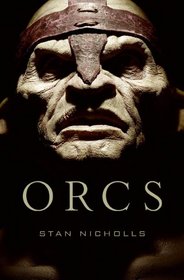Helpful Score: 2
A very intense book, makes you want to stay up late and finishit in one sitting
Helpful Score: 1
That was refreshing, I read it in about 3 days and not at work, couldnt stop.
Very interesting view point of orcs being heroes. This concept words great and really look forward to the new series.
The Orc as hero is an intriguing concept, and I wish I could have enjoyed this book more. However, I have to agree with a previous reviewer's comment that none of the characters acted with any degree of consistency. From one scene to another, the supporting characters just seemed to exist to provide arguments against whatever actions the main character, Stryke, wanted to take. Not only that, the supporting characters changed their views on a regular basis.
The Orc queen is the usual stereotypical, incredibly beautiful personification of evil as well.
Also, the author uses passive verbs too much. For instance, instead of saying that an orc held an adversary while another disemboweled him, the author says that the adversary was held by an orc, while another was busy with the disembowelment. I'd much prefer fewer words, with more action verbs. This may be sloppy editing, though.
All in all, not bad, just not great.
The Orc queen is the usual stereotypical, incredibly beautiful personification of evil as well.
Also, the author uses passive verbs too much. For instance, instead of saying that an orc held an adversary while another disemboweled him, the author says that the adversary was held by an orc, while another was busy with the disembowelment. I'd much prefer fewer words, with more action verbs. This may be sloppy editing, though.
All in all, not bad, just not great.
Fast moving, lots of fighting and action; not a lot of character development outside of stereotypes. A fun quick read for Fantasy lovers who want to hear about one battle after another. Still, kind of fun to have orcs as the good guys and us humans as the bad guys. these orcs, however, more resemble US Marines than any Tolkein creation.
I only read the first novel in this ominbus, as its title (Bodyguard of LIghtning) was easily the most interesting thing about it. A quote from Tom Holt on the back claims the book features "a core of skillfully drawn, fully realized characters who engage your sympathy from the start and never let go," but I found exactly the opposite: the characters range from the tolerable to evil personified and not a single one behaves one, with any foresight, and two, with any consistency from scene to scene. The leader of the band of orcs, Stryke, never has any clear motivation for his actions, and his underlings rotate for the position of the one arguing for and against whatever action he proposes, but not in any way that seems to give them a consistent character. It seems almost random which of his sergeants is going to argue in each scene. Meanwhile, the hints at a larger picture don't particularly tantalize, the battles aren't particularly fun to read, and the novel has no ending whatsoever -- it is merely part one of three, which is less bothersome in an omnibus edition but would have irked me to no end if I were reading the novels as they were published one by one. Even with the cliffhanger ending I felt absolutely no desire to turn the page and start book two.
The final straw, for me, lay with the character of Jennesta. To me she represented the height of the misogyny I thought was being slowly weaned out of fantasy writers: a villainess who is beautiful in an uncanny way, completely irrational (she kills any one who disobeys her instructions, even when it is to her detriment as the disobedience often lies in trying to further her own ends), and chooses to have sex with prisoners then kill them at the moment of sexual release. The only sop to the strides women have made in the fantasy genre is the character of Coilla, who gets to fight on the side of "good," but she is significantly undercut by the shoddy characterization mentioned above.
The final straw, for me, lay with the character of Jennesta. To me she represented the height of the misogyny I thought was being slowly weaned out of fantasy writers: a villainess who is beautiful in an uncanny way, completely irrational (she kills any one who disobeys her instructions, even when it is to her detriment as the disobedience often lies in trying to further her own ends), and chooses to have sex with prisoners then kill them at the moment of sexual release. The only sop to the strides women have made in the fantasy genre is the character of Coilla, who gets to fight on the side of "good," but she is significantly undercut by the shoddy characterization mentioned above.




